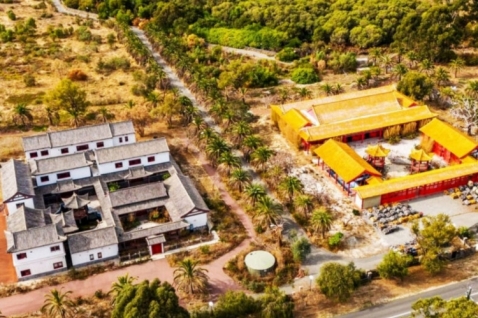
Exploring the acquisition of a villa in Bali emerges as an appealing venture for investors, retirees, and holidaymakers, all captivated by the island's breathtaking landscapes and the buoyant property market.
It becomes crucial to grasp the intricacies of land acquisition, especially in a foreign setting. Bali introduces clear distinctions between freehold (Hak Milik) and leasehold (Hak Sewa) arrangements, each entailing different rights and tenure periods. Prospective buyers must note that Hak Milik is exclusive to Indonesian citizens, while foreigners commonly gravitate towards leasehold agreements. Navigate the enticing possibilities as you explore beachfront villas for sale in Bali, immersing yourself in the allure of coastal living within this tropical paradise.
Financial considerations are equally important when investing in Balinese real estate. With a range of prices across various locations, setting a realistic budget that includes potential legal fees, taxes, and other transactional costs is essential. Buyers are advised to conduct thorough research on the market, particularly if they seek properties that provide not only personal enjoyment but also investment returns. Beachfront villas, due to their high demand from tourists, often carry a premium but may offer better rental yields, thus making properties in these areas worthy of consideration.
Understanding the Property Market in Bali
Before diving into the intricacies of Bali's real estate climate, it's critical to acknowledge the island's diverse property market, which draws a myriad of investors due to its unique ownership structures and potential for robust return on investment (ROI).
Key Areas and Popular Locations
Bali's property market is notably segmented by area, with locations such as Canggu, Seminyak, and Ubud being highly sought after by investors and potential villa owners. Each area offers its own ambiance—Canggu for its trendy cafes and surf culture, Seminyak for luxury shopping and nightlife, and Ubud for its tranquil, cultural atmosphere. The choice of area significantly impacts budget considerations and potential rental business prospects.
Types of Property Ownership in Indonesia
In Indonesia, there are three main types of property ownership that foreigners usually consider:
-
Hak Milik (Freehold): This is the strongest form of property ownership, but it is not available to foreigners.
-
Hak Guna Bangunan (Right to Build): Allows the owner to construct buildings on land they do not own.
-
Hak Sewa (Leasehold): This is the most common route for foreigners, involving leasing the land for a specified period, usually up to 25 years and extendable.
Understanding these different types of ownership is crucial for anyone looking to invest in property in Bali, as the laws and regulations surrounding them affect everything from the legal process of acquisition to the potential for generating passive income.
Assessing the Investment Potential
When evaluating the investment potential of a villa in Bali, investors should consider the economic climate, potential for ROI, and their own budget. The Bali real estate market has shown resilience and signs of growth, which can indicate good prospects for a profitable rental business or long-term asset appreciation. However, due diligence is essential in assessing property investment viability, legal compliance, and expected returns.
Legal and Financial Considerations
When acquiring a villa in Bali, it’s paramount to navigate the complex legal structures and consider the financial responsibilities entailed. Attention to detail in due diligence, understanding local laws, and a clear financial strategy are critical.
Compliance with Indonesian Laws
In Indonesia, property ownership laws are unique: foreigners typically cannot own land outright, but they can secure a leasehold agreement or incorporate a PT PMA (foreign investment company) for a longer-term investment. It’s vital to ensure that the zoning regulations align with intended use, and due diligence is done to verify land titles and existing building permits (IMB). Establishing a PT PMA allows foreigners certain rights, providing a legal framework for property acquisition under Indonesian law.
-
Legal Entities Involved: Lawyer, PT PMA, Real Estate Agent
-
Critical Documents: Lease Agreements, IMB, Land Titles
-
Regulatory Compliance: Zoning Regulations, Foreign Ownership Restrictions
Navigating the Purchase Process
The purchase process demands engagement with reputable real estate agents and a seasoned lawyer. Experts will help navigate local laws and regulations, secure a proper lease agreement if land ownership is not an option, and do thorough due diligence. Buyers should confirm that the infrastructure of the internet and utilities in the villa meets their requirements, especially if they are digital nomads relying on connectivity. During the purchase, clear understanding and detailed contracts are crucial to avoid future legal complications.
-
Key Professionals: Reputable Real Estate Agent, Lawyer
-
Considerations: Infrastructure Adequacy, Contract Clarity, Due Diligence
Long-Term Financial Planning and Tax Implications
Long-term financial planning is essential, including budgeting for initial purchase costs, ongoing taxes, and maintenance. Tax implications vary whether you’re leasing or have established a PT PMA; hence, an accurate budget forecast is fundamental. Investment in Bali’s villa market should be cautiously optimistic, considering trends and potential pandemic impacts. Consulting a financial advisor specialized in Indonesian real estate investment can provide insights into the property market and help devise a solid financial plan.
-
Financial Factors: Budgeting, Ongoing Taxes, Maintenance Costs
-
Investment Considerations: Market Trends, Pandemic Impact, Return on Investment
Conclusion
Key Takeaways
-
Land ownership in Bali is differentiated by strict legal terms.
-
Budgets should include all potential purchase and ownership costs.
-
Proximity to the beach can affect property value and rentability.
When acquiring a villa in Bali, it is essential that investors navigate the legal landscape with care, ensuring all necessary permits and legal documents are in order. Financial considerations also play a critical role; investors should be aware of building costs and be prepared for fluctuations in the market. Consulting with local real estate professionals can provide valuable insights into the process, helping to secure a successful investment. They must commit to due diligence to ensure compliance with Indonesian property laws and safeguard their investment.















